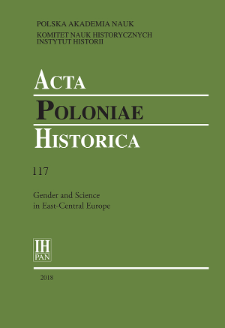- Search in all Repository
- Literature and maps
- Archeology
- Mills database
- Natural sciences
Advanced search
Advanced search
Advanced search
Advanced search
Advanced search

Object
Title: Spaces of Knowledge and Gender Regimes: From Double Marginalization to a Gendered History of Knowledge in Central and Eastern Europe
Subtitle:
Gender and Science in East Central Europe ; Acta Poloniae Historica T. 117 (2018)
Contributor:
Instytut Historii Polskiej Akademii Nauk ; Komitet Nauk Historycznych Polskiej Akademii Nauk ; Hyatt, Francesca : Tł.
Publisher:
Instytut Historii im. Tadeusza Manteuffla Polskiej Akademii Nauk
Place of publishing:
Description:
Type of object:
Abstract:
The article explores the heuristic potential of gender studies and area studies (especially those concerned with Central and Eastern Europe) and appeals for a decentring of research units such as ‘general history’ and ‘Europe’ within historiography. It criticises the often mechanical use of spatial categories that ignores the fabrication of spaces by area specialists, and the reification of gender identities within women’s and gender studies. It argues for a combination of gender and area sensitive research in order to evade the juxtaposition of constructivism vs. essentialism. History of knowledge and feminist theory of science are described as useful tools for such an approach.
References:
Butler Judith, Gender Trouble. Feminism and the Subversion of Identity (New York et al., 1990).
Chakrabarty Dipesh, Provincializing Europe: Postcolonial Thought and Historical Difference (Princeton, 2000).
Dale Gareth, Miklóssy Katalin, and Segert Dieter (eds.), The Politics of East European Area Studies (London, 2016).
Haraway Donna, Simians, Cyborgs, and Women. The Reinvention of Nature (New York and London, 1991).
Hark Sabine, Dissidente Partizipation. Eine Diskursgeschichte des Feminismus (Frankfurt am Main, 2005).
Hassauer Friederike, Homo. Academica. Geschlechterkontrakte, Institution und die Verteilung des Wissens (Wien, 1994).
Kraft Claudia, Die Polin als Staatsbürgerin: Reformdebatten in der zweiten Hälfte des 18. Jahrhunderts (Leipzig, 2009).
Krzoska Markus, Lichy Kolja, and Rometsch Konstantin, ‘Jenseits von Ostmitteleuropa? Zur Aporie einer deutschen Nischenforschung’, Journal of Modern European History, xvi (2018), 40–63.
Massey Doreen, ‘Politics and Space/Time’, New Left Review, 196 (1992), 65–84.
Pechriggl Alice and Bidwell-Steiner Marlen (eds.), Brüche, Geschlecht. Gesellschaft. Gender Studies zwischen Ost und West (Wien, 2003).
Sarasin Philipp‚ ‘Was ist Wissensgeschichte?’, Internationales Archiv für Sozialgeschichte der deutschen Literatur, xxxvi, 1 (2011), 159–72.
Scott Joan Wallach‚ ‘Gender. A Useful Category of Historical Analysis’, American Historical Review, xci, 5 (1986), 1053–75.
Tötösy de Zepetnek Steven‚ ‘Configurations of Postcoloniality and National Identity: Inbetween Peripherality and Narratives of Change’, The Comparatist: Journal of the Southern Comparative Literature Association, xxiii (1999), 89–110.
Wolff Larry, Inventing Eastern Europe: the Map of Civilization on the Mind of the Enlightenment (Stanford, 1994).
Zarycki Tomasz, Ideologies of Eastness in Central and Eastern Europe (London, 2014).
Relation:
Volume:
Start page:
End page:
Detailed Resource Type:
Format:
Resource Identifier:
oai:rcin.org.pl:72195 ; 0001-6829 ; 2450-8462 ; 10.12775/APH.2018.117.01
Source:
IH PAN, sygn. A.295/117 Podr. ; IH PAN, sygn. A.296/117 ; click here to follow the link
Language:
Rights:
Licencja Creative Commons Uznanie autorstwa-Użycie niekomercyjne-Bez utworów zależnych 4.0
Terms of use:
Zasób chroniony prawem autorskim. [CC BY-ND 4.0 Międzynarodowe] Korzystanie dozwolone zgodnie z licencją Creative Commons Uznanie autorstwa-Bez utworów zależnych 4.0, której pełne postanowienia dostępne są pod adresem: ; -
Digitizing institution:
Instytut Historii Polskiej Akademii Nauk
Original in:
Biblioteka Instytutu Historii PAN
Projects co-financed by:
Narodowy Program Rozwoju Humanistyki
Access:
Object collections:
- Digital Repository of Scientific Institutes > Partners' collections > Institute of History PAS > Serials
- Digital Repository of Scientific Institutes > Partners' collections > Institute of History PAS > Institute Publications
- Digital Repository of Scientific Institutes > Partners' collections > Institute of History PAS > Institute Publications > Journals
- Digital Repository of Scientific Institutes > Partners' collections > Institute of History PAS > Institute Publications > Journals > Acta Poloniae Historica
- Digital Repository of Scientific Institutes > Literature > Journals/Articles
Last modified:
Sep 22, 2023
In our library since:
Jun 4, 2019
Number of object content downloads / hits:
558
All available object's versions:
https://rcin.org.pl./publication/94622
Show description in RDF format:
Show description in RDFa format:
Show description in OAI-PMH format:
Objects Similar
Bogucka, Maria (1929–2020)
Górecki, Przemysław
Connell, Raewyn

 INSTYTUT ARCHEOLOGII I ETNOLOGII POLSKIEJ AKADEMII NAUK
INSTYTUT ARCHEOLOGII I ETNOLOGII POLSKIEJ AKADEMII NAUK
 INSTYTUT BADAŃ LITERACKICH POLSKIEJ AKADEMII NAUK
INSTYTUT BADAŃ LITERACKICH POLSKIEJ AKADEMII NAUK
 INSTYTUT BADAWCZY LEŚNICTWA
INSTYTUT BADAWCZY LEŚNICTWA
 INSTYTUT BIOLOGII DOŚWIADCZALNEJ IM. MARCELEGO NENCKIEGO POLSKIEJ AKADEMII NAUK
INSTYTUT BIOLOGII DOŚWIADCZALNEJ IM. MARCELEGO NENCKIEGO POLSKIEJ AKADEMII NAUK
 INSTYTUT BIOLOGII SSAKÓW POLSKIEJ AKADEMII NAUK
INSTYTUT BIOLOGII SSAKÓW POLSKIEJ AKADEMII NAUK
 INSTYTUT CHEMII FIZYCZNEJ PAN
INSTYTUT CHEMII FIZYCZNEJ PAN
 INSTYTUT CHEMII ORGANICZNEJ PAN
INSTYTUT CHEMII ORGANICZNEJ PAN
 INSTYTUT FILOZOFII I SOCJOLOGII PAN
INSTYTUT FILOZOFII I SOCJOLOGII PAN
 INSTYTUT GEOGRAFII I PRZESTRZENNEGO ZAGOSPODAROWANIA PAN
INSTYTUT GEOGRAFII I PRZESTRZENNEGO ZAGOSPODAROWANIA PAN
 INSTYTUT HISTORII im. TADEUSZA MANTEUFFLA POLSKIEJ AKADEMII NAUK
INSTYTUT HISTORII im. TADEUSZA MANTEUFFLA POLSKIEJ AKADEMII NAUK
 INSTYTUT JĘZYKA POLSKIEGO POLSKIEJ AKADEMII NAUK
INSTYTUT JĘZYKA POLSKIEGO POLSKIEJ AKADEMII NAUK
 INSTYTUT MATEMATYCZNY PAN
INSTYTUT MATEMATYCZNY PAN
 INSTYTUT MEDYCYNY DOŚWIADCZALNEJ I KLINICZNEJ IM.MIROSŁAWA MOSSAKOWSKIEGO POLSKIEJ AKADEMII NAUK
INSTYTUT MEDYCYNY DOŚWIADCZALNEJ I KLINICZNEJ IM.MIROSŁAWA MOSSAKOWSKIEGO POLSKIEJ AKADEMII NAUK
 INSTYTUT PODSTAWOWYCH PROBLEMÓW TECHNIKI PAN
INSTYTUT PODSTAWOWYCH PROBLEMÓW TECHNIKI PAN
 INSTYTUT SLAWISTYKI PAN
INSTYTUT SLAWISTYKI PAN
 SIEĆ BADAWCZA ŁUKASIEWICZ - INSTYTUT TECHNOLOGII MATERIAŁÓW ELEKTRONICZNYCH
SIEĆ BADAWCZA ŁUKASIEWICZ - INSTYTUT TECHNOLOGII MATERIAŁÓW ELEKTRONICZNYCH
 MUZEUM I INSTYTUT ZOOLOGII POLSKIEJ AKADEMII NAUK
MUZEUM I INSTYTUT ZOOLOGII POLSKIEJ AKADEMII NAUK
 INSTYTUT BADAŃ SYSTEMOWYCH PAN
INSTYTUT BADAŃ SYSTEMOWYCH PAN
 INSTYTUT BOTANIKI IM. WŁADYSŁAWA SZAFERA POLSKIEJ AKADEMII NAUK
INSTYTUT BOTANIKI IM. WŁADYSŁAWA SZAFERA POLSKIEJ AKADEMII NAUK




































